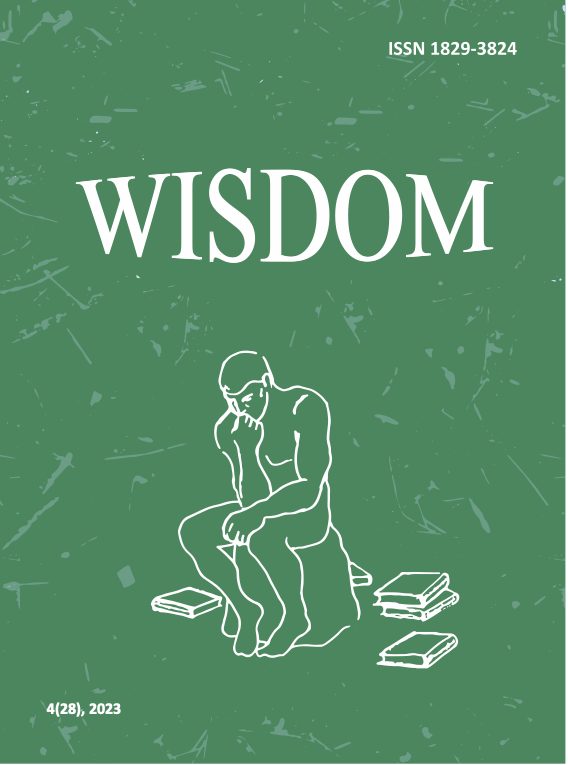Education in the “Bending” of the Modern Political Landscape
DOI:
https://doi.org/10.24234/wisdom.v11i2.211Keywords:
information society, models of modern education, principles of state education, the human dimension of education, spiritual values of the nation, anthropological crisis, intellectual consumerismAbstract
The article formulates and justifies the idea that the problem of education is a timeless and universal social problem, on the solution of which depends such things as the spiritual and moral health of a nation, the degree of its intellectual development, the limits of disclosing its creative potential, and through all this the stability of the state. The transition to an information society (the knowledge society) is reduced to the abandonment of the centuries-old tradition of the “culture of knowledge”, which destroys the existential foundations of the person who produces and consumes this knowledge. To overcome these destructive trends for modern societies, it is expedient to revive the goals of the educational system determined by the national culture, the most important of which is the education of man as a spiritual and political being.
Downloads
References
Aristotle. (1984b). Politika (Policy, in Russian). Book One, Vol. 4. Moscow: Misl.
Ball, S. J. (2003).Social Justice in the Head. Are We all Libertarians Now? InV.Carol (Ed.) Social Justice, education and Identity (pp. 31-50). L.N.Y.: Routledge Falmer.
Fichte, J. G. (1993a). Opyt novogo izlozheniya naukoucheniya (Experience of a New Exposition of the Science of Learning, in Russian). (Vol. 1). St. Petersburg: Miphril.
Fichte, J. G. (1993b). Yasnoe kak solntse so-obshchenie mirovoi publike o podlinnoi sushchnosti noveishei filosofii (Sun Clear Statement: the Message to the World about the True Essence of Modern Philosophy, in Russian). (Vol. 1). St. Petersburg: Miphril.
Hegel, G. V. F. (1990).Filosofiya prava.(The Philosophy of Right, in Russian). Moscow: Misl.
Jaspers, K. (2000). Ideya universiteta (The Idea of the University, in Russian). Topos, 3. Minsk.
Karpov, A. O. (2012). Kommodifikatsiya obrazovaniya v rakurse ego celei, akseologii i logiki kulturnogo dvizheniya (Commodification of Education in the Perspective of its Goals, Axiology and Logic of Cultural Movement, in Russian). Issues of Philosophy, 10, 85-96. Moscow.
Karpov, A. O. (2015). Sotsialnaya i ekzistentsialnaya ontologiya obrazovaniya. (Social and Existential Ontology of Education, in Rassian).Issues of Philosophy, 1, 3-13. Moscow.
Materiali Kruglogo Stola: Problemi Philosophii (Materials of the Round Table: Issues of Philosophy, in Russian). (2015). Science. Technologies. Human, 9, 7-41. Moscow.
Mirumyan, R. A. (2003). Patmapilisopayakan hayecakargery’ XIX dari hay pilisopayut’yan medj (Philosophical and Historical Concepts in the Armenian Philosophy of the XIX Century: Methodological Analysis, in Armenian). Yerevan: NoyanThapan.
Mirumyan, R. A. (2011). Armyanskoe kul’tur-noe nasledie kak mekhanizm samo-zashchiti natsii v usloviyakh globali-zatsii (k voprosu o politicheskoi kontseptsii kulturi) (Armenian Cultural Heritage as a Mechanism of National Self-Defense in the Context of Globalization (to the Question of the Political Concept of Culture), in Russian). Proceedings of the International Scientific Conference. Armenia in the Dialogue of Civilizations, April 28. (pp. 82 – 90). Nizhny Novgorod.
Mirumyan, R. A. (2014). Chelovecheskoe izmerenie v sovremennoj sisteme obrazovaniy? (politicheskij aspekt) (Human Measurement in the Modern System of Education (Political and Philosophical Aspect), in Russian). Psychology of the 21st Century: Theory, Practice, Prospect: Materials of the IV International Scientific Conference, February 15-16. (pp 35-44). Prague: V?deckovydavatelské centrum «Sociosféra-CZ».
Mirumyan, R. A. (2016). Natsionalnii yazik kak
pervoosnova cul’turnoii dentichnosti natsii (politico-philosophskij aspekt) (The National Language as the Primary Principle of the Cultural Identity of the Nation (Political and Philosophical Aspect), in Russian).Bulletin of the Russian - Armenian (Slavonic) University. Series: Humanities and Social Scienc-es, 47-62. Yerevan.
Mirumyan, R. A. (2016).Binom tserkvi i natsii kak opit osushchestvleniya universal’nogo v unikal’nom: k voprosu o spetsi¬fike armyanskogo natsionalnogo samo¬soznaniya (politico-filosofskij aspekt) (Binomial of the Church and the Nation as an Experience of Universal Realization in a Unique: to the Issue of the Specifics of the Armenian National Identity (Political and Philosophical Aspect), in Russian). Materials of the International Scientific Forum: National Security Problems in the Context of Globalization and Integration Processes (Interdisciplinary Aspects). (pp. 297-309). Yerevan.
Plato. (1994). Politik (Politician, in Russian). (Vol. 4). Moscow: Misl.
Plato. (1994).Gosudarstvo (The State, in Rus-sian). (Vol. 3). Moscow: Misl.
Rousseau, J.-J. (1907). Emil, ili o vospitanii (Emil, or on Education, in Russian). St. Petersburg: Izdatelstvo gazeti Shkola i Zhizn.
Schmidt, K. (1877). Istoriya pedogogiki v 4 tomakh (The History of Pedagogy in 4 volumes, in Russian). Publ. II. (4 Vols). Moscow: Tipografia imeni Martinova I. K.
Slutsky, M. S. (1980). Nauka i obrazovanie. (Science and Education, in Russian) Science in Social, Epistemological and Value Aspects, 61-76. Moscow: Nauka.
Szkudlarek, T. (2013). Introduction: Education and the Political. In T. Szkudlarek (Ed.) Education and the Political.New Theoretical Articulations. (pp. 1-14). Rotterdam: Sense Publisthess.
Downloads
Published
How to Cite
Issue
Section
License
Creative Commons Attribution-Non-Commercial (CC BY-NC). CC BY-NC allows users to copy and distribute the article, provided this is not done for commercial purposes. The users may adapt – remix, transform, and build upon the material giving appropriate credit, and providing a link to the license. The full details of the license are available at https://creativecommons.org/licenses/by-nc/4.0/.















